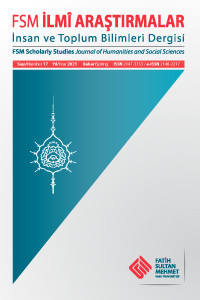Yemekten Önce ve Sonra Tuz Yemeyi Tavsiye Eden Rivâyetlere Dair Bir Araştırma
Yemekten önce ve sonra tuz yemenin sünnet olduğuna dair bir ön kabul toplumumuzda
Anahtar Kelimeler:
Hadis, Gazzâlî, yemek, tuz, mevzûʿ hadis
A Research on the Narrations that it Advises Eat Salt Before and After Meal
An acceptance that it is a Sunnah to eat salt before and after meal it is very commonin our community. According to our findings, the oldest hadith support of this acceptanceis al-Musnad of al-Harith b. Abū Usāma. It seems in the narration marfūʿ in this book thatThe Holy Prophet advised Ali to eat salt before and after meals. However, the muhaddithsstated that this narration is very daʿīf or fabricated, because of the three very daʿīf narrativesin its sanad that one of the three narratives who were accused with the fabricatinghadith. The conditions of the its narration mawqūf are not very different. However, somescholars such as Abū Tālib al-Makkī and Ghazālī did not have authority over the hadith,so they mentioned this narration mawqūf in the their books and said that this practice wasin the rules of eating. Later, this acceptance spread rapidly due to the deep reverence ofthe people against the scholars like Ghazālī and Jīlānī and added to the belief that sunnahis opening the fasting opening with salt. In article, after the technical details of the subjecthave been explained, it has been noted that the absolute sources of reference of religionnot the basic sources of religion are very effective at spreading the fabricated hadiths andkeeping the sahīh hadiths on the background and the damage caused by this attitude hasbeen noted.
Keywords:
Hadith, Ghazālī, eat, salt, fabricated hadith,
___
- Aclûnî, Ebü’l-Fidâ İsmâîl b. Muhammed b. Abdilhâdî el-Cerrâhî el-Aclûnî,Keşfü’l-ḫafâ ve müzîlü’l-ilbâs ʿamme’ştehera mine’l-eḥâdîs alâ elsineti’n-nâs,Kâhire, el-Mektebetü’l-asriyye, 2000.
- ISSN: 2147-3153
- Başlangıç: 2012
- Yayıncı: Fatih Sultan Mehmet Vakıf Üniversitesi
Sayıdaki Diğer Makaleler
Schumpeter ve Ülgener’in İktisadi Krizlere Bakış Açıları
Özer ÖZÇELİK, Ezgi Babayiğit SUNAY
Yemekten Önce ve Sonra Tuz Yemeyi Tavsiye Eden Rivâyetlere Dair Bir Araştırma
Adalet ve Siyaset İlişkisi Üzerine
Aile Yeterlik Ölçeklerinin Türkçe’ye Uyarlanması, Geçerlik ve Güvenirliği
Tuğba Yılmaz BİNGÖL, Melek KALKAN
Nizamüddin Ömer b. Ali el-Merginânî ve Cevâhiru’l-Fıkh Adlı Eserindeki İstidlal ve Tercih Yöntemleri
Türkçe-Arnavutça Manzum Sözlük Dürre-i Manzûme’nin Bilinmeyen İki Nüshası
Sezai Karakoç’un Eğitim-Öğretimle İlgili Görüşleri: Eserlerinden Hareketle Fert ve Toplum İdeali
